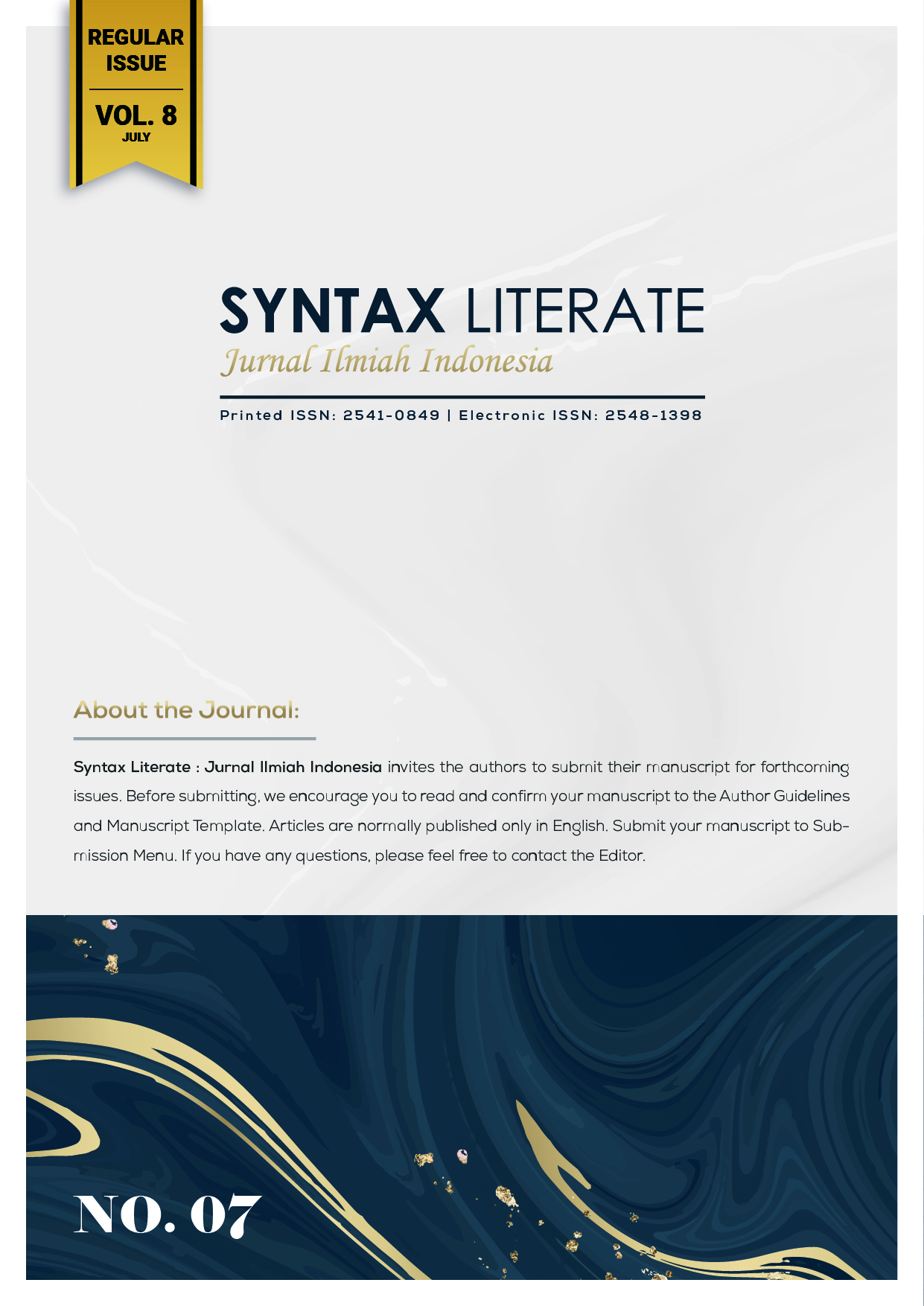Restorative Justice dalam Perkara Tindak Pidana Pencurian (Studi Putusan Nomor 28/Pid.B/2022/Pn.Lbb)
Abstract
Law in Indonesia is divided into criminal law and civil law. Criminal law is the law that regulates what actions are prohibited and gives punishment to those who violate them and regulates how to bring cases to court, for example theft. One of the law enforcement efforts in overcoming the crime of theft that is firm, consistent and integrated, can be done in one way, namely the application of restorative justice. The research method used is a normative juridical method with a law approach and a case approach. From the results of the study, it was found that the legal basis for restorative justice in the case of the crime of theft is based on the Supreme Court Regulation Number 02 of 2012 concerning Adjustment of the Limits of Minor Crimes and the Amount of Fines in the Criminal Code, Article 4 Memorandum of Understanding with the Chief Justice of the Supreme Court of the Republic of Indonesia Minister of Law and Human Rights Man, the Attorney General of the Republic of Indonesia, the Head of the Indonesian National Police regarding the Implementation of Adjustment on the Limits of Minor Crimes and the Amount of Fines, Quick Examination Procedures, and the Application of Restorative Justice Number: 131/KMA I SKB IX/2012 Number: M. HH - 07. HM. 03. 02 of 2012 Number: KEP - 06 /E IEJP /10/2012 Number: B/39/X/2012 Article 3 Regulation of the Indonesian National Police Number 8 of 2021 concerning Handling of Crimes Based on Restorative Justice and Article 4 paragraph (2 ), Article 5 paragraph (1) of the Prosecutor's Office Regulation Number 15 of 2020 concerning Termination of Prosecution Based on Restorative Justice. The judge's consideration in deciding restorative justice for the theft criminal case in the decision number 28/Pid.B/2022/Pn.Lbb was based on the testimony of witness Mulyono, several previous decisions related to restorative justice and Article 10 paragraph (1) of Law Number 48 Year 2009 on Judicial Power.
Downloads
References
Anggara, P., & Mukhlis, M. (2019). Penerapan Keadilan Restoratif Pada Tindak Pidana Pencurian Ringan. Jurnal Ilmiah Mahasiswa Bidang Hukum Pidana, 3(3), 468–477.
Anisah, S., & Raharjo, T. (2018). Batasan Melawan Hukum Dalam Perdata Dan Pidana Pada Kasus Persekongkolan Tender. Jurnal Hukum Ius Quia Iustum, 25(1), 24–48.
Arief, H., & Ambarsari, N. (2018). Penerapan Prinsip Restorative Justice Dalam Sistem Peradilan Pidana Di Indonesia. Al-Adl: Jurnal Hukum, 10(2), 173–190.
Ariefianto, Y. (2016). Penerapan Restoratif Justice Dalam Penyelesaian Kasus Kecelakaan Lalu Lintas (Doctoral dissertation, Brawijaya University).
Azhari, M. (N.D.). Tinjauan Kriminologis Tindak Pidana Pemerkosaan Dalam Ruang Lingkup Rumah Tangga Di Muara Enim.
Budoyo, S., & Sari, R. K. (2019). Eksistensi restorative justice sebagai tujuan pelaksanaan diversi pada sistem peradilan anak di Indonesia. Jurnal Meta-Yuridis, 2(2).
Farhan, A. (2023). Penerapan Restorative Justice Dalam Tindak Pidana Pencurian Pada Tahap Pemeriksaan di Persidangan (Studi Kasus Putusan Nomor 28/Pid. B/2022/Pn. Lbb).
Fatoni, K., & Wibawa, I. (2023). Penanganan Tindak Pidana Narkotika Berdasarkan Keadilan Restoratif di Direktorat Reserse Narkoba Polda Jateng.
Fianhar. (n.d.). “Surat Edaran Kapolri Nomor 8 tahun 2018 tentang Penerapan Restorative Justice dalam Penyelesaian Perkara Pidanaâ€, diakses pada tanggal 29 Oktober 2022, Pukul 15:30 WIB.
Hambali, A. R. (2020). Penegakan Hukum Melalui Pendekatan Restorative Justice Penyelesaian Perkara Tindak Pidana. Kalabbirang Law Journal, 2(1), 69–77.
Hartono, B. (2015). Analisis Keadilan Restoratif (Restorative Justice) Dalam Konteks Ultimum Remedium Sebagai Penyelesaian Permasalahan Tindak Pidana Anak. Pranata Hukum, 10(2), 160342.
Hattu, J. (2020). Pertanggungjawaban pidana pengambilan jenasah covid-19 secara paksa berdasarkan aturan tindak pidana umum dan tindak pidana khusus. Jurnal Belo, 6(1), 11–31.
Irawan, D. (2022). Tinjauan Hukum Atas Keadilan Restoratif Sebagai Perlindungan Hukum Bagi Korban Tindak Pidana Di Indonesia. Lex Administratum, 10(5).
Lubis, M. A., & Siregar, S. A. (2020). Restorative Justice Sebagai Model Perlindungan Terhadap Anak Yang Berhadapan Dengan Hukum. PKM Maju UDA, 1(1), 8–24.
Nur Aziz, N. A. (2019). Tinjauan Yuridis Tindak Pidana Penarikan Keuntungan Atas Perbuatan Cabul Menurut Pasal 506 Kitab Undang Undang Hukum Pidana (KUHP).
Nurwianti, A., Gunarto, G., & Wahyuningsih, S. E. (2017). Implementasi Restoratif/Restorative Justice Dalam Penyelesaian Tindak Pidana Kecelakaan Lalu Lintas Yang Dilakukan Oleh Anak Di Polres Rembang. Jurnal Hukum Khaira Ummah, 12(4), 705–716.
Purba, J. (2017). Penegakan hukum terhadap tindak pidana bermotif ringan dengan restorative justice. Jala Permata Aksara.
Purwoleksono, D. E. (2019). Hukum Pidana Untaian Pemikiran. Airlangga University Press.
Rahmi, I., & Rizanizarli, R. (2020). Penerapan Restorative Justice Dalam Penyelesaian Tindak Pidana Pencurian Oleh Anak Dalam Perspektive Adat Aceh. Syiah Kuala Law Journal, 4(1), 11–20.
Sabir Laluhu. (n.d.). “MA Terbitkan Pedoman Penerapan Keadilan Restoratif dalam Perkara Pidanaâ€, diakses pada tanggal 29 Oktober 2022, pukul 15:50 WIB.
Satriadi. (2022). “Pendekatan Restorative Justice Dalam Penyelesaian Tindak Pidana Pencurian Ringan Perspektif Hukum Islamâ€, Al-Syakhshiyyah: Jurnal Hukum Keluarga Islam dan Kemanusiaan, Vol. 4, No.1.
Siregar, F. A. (2018). Ciri hukum adat dan karaktristiknya. Jurnal Al-Maqasid: Jurnal Ilmu Kesyariahan Dan Keperdataan, 4(2), 1–14.
Suharto, S., & Efendi, J. (2016). Panduan praktis bila anda menghadapi perkara pidana: mulai proses penyelidikan hingga persidangan.
Yudhianto, H. (2018). Penerapan Asas Kesalahan Sebagai Dasar Pertanggungjawaban Pidana Korporasi. Karya Ilmiah Dosen, 4(2).
Copyright (c) 2023 Enny Yulistiawati, Arif Awangga

This work is licensed under a Creative Commons Attribution-ShareAlike 4.0 International License.











